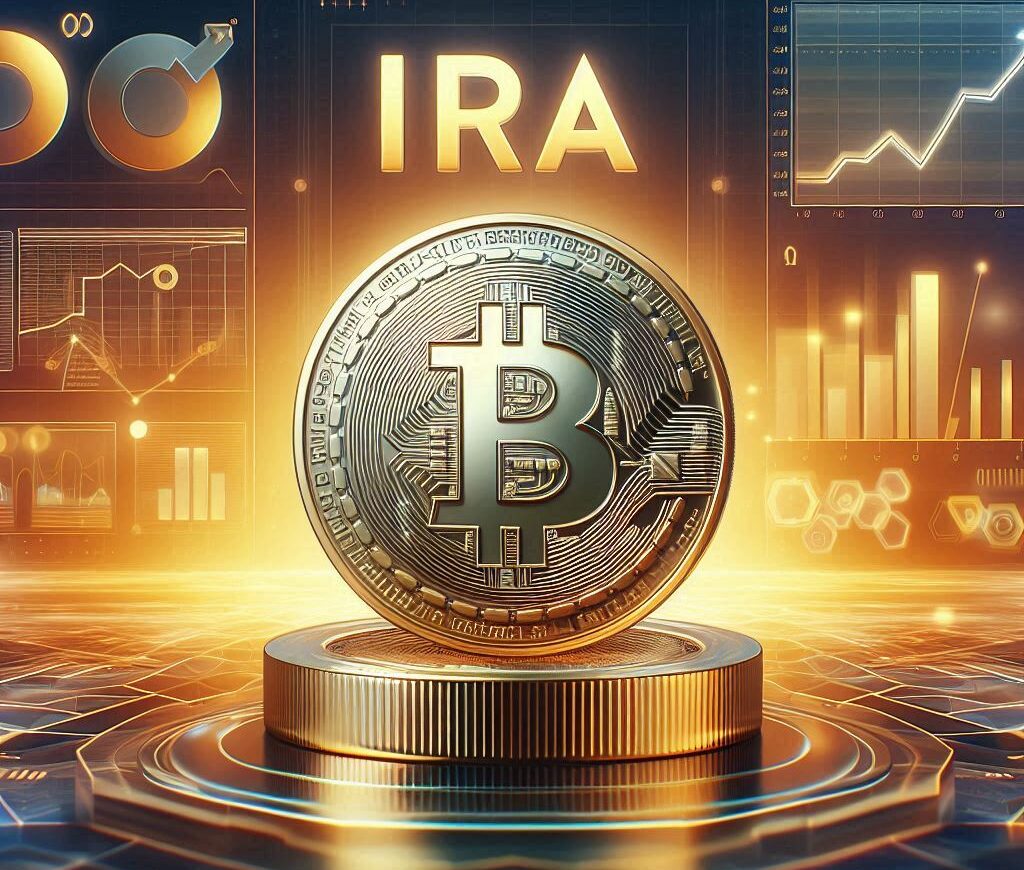Bitcoin IRA involves investing in cryptocurrency for retirement
What is a Bitcoin IRA?
A Bitcoin IRA is a self-directed individual retirement account that allows you to invest in cryptocurrencies like Bitcoin, Ethereum, Litecoin, and more. Unlike traditional IRAs, which are limited to stocks, bonds, and mutual funds, a Bitcoin IRA gives you the freedom to diversify your retirement portfolio with digital assets.
Self-directed IRAs have been around for decades, offering investors more control over their retirement savings. They can hold alternative assets like real estate, precious metals, and private company shares. Bitcoin IRAs are a newer addition to this category, catering to the growing interest in cryptocurrencies.
Related:How To Set Up A Bitcoin IRA
It’s important to note that a Bitcoin IRA is not a separate type of account, but rather a self-directed IRA that includes Bitcoin or other cryptocurrencies as part of its investment mix. You can choose to hold only cryptocurrencies in your Bitcoin IRA, or you can combine them with other alternative assets and traditional investments.
How Does a Bitcoin IRA Work?
Setting up and managing a Bitcoin IRA involves a few key steps:
1. Choose a Bitcoin IRA provider
To start a Bitcoin IRA, you’ll need to find a reputable provider that specializes in cryptocurrency retirement accounts. These providers handle the setup and administration of your account, as well as the secure storage of your digital assets.
2. Fund your account
You can fund your Bitcoin IRA in two ways: by making a new contribution or by transferring funds from an existing IRA or 401(k). If you’re transferring funds, you’ll need to initiate a rollover or direct transfer to move the money into your new Bitcoin IRA.
3. Select your investments
Once your account is funded, you can choose which cryptocurrencies you want to invest in. Most Bitcoin IRA providers offer a range of popular coins like Bitcoin, Ethereum, Litecoin, and Ripple. Some also provide access to lesser-known altcoins.
4. Securely store your cryptocurrencies
One of the key challenges with holding cryptocurrencies is ensuring their security. Bitcoin IRA providers typically offer cold storage solutions, which keep your digital assets offline to protect them from hacking and theft. Some providers also offer insurance against loss or theft.
5. Monitor and manage your investments
Like any retirement account, it’s important to regularly monitor and manage your Bitcoin IRA. You can work with your Bitcoin IRA provider to track your holdings, make trades, and rebalance your portfolio as needed.
Benefits of a Bitcoin IRA
1. Diversification
Adding Bitcoin and other cryptocurrencies to your retirement portfolio can help diversify your holdings beyond traditional assets. Cryptocurrencies have historically had low correlations with stocks and bonds, meaning they may provide a hedge against market volatility.
2. Long-term growth potential
Despite their short-term volatility, many experts believe that cryptocurrencies have significant long-term growth potential. As more individuals and institutions adopt digital assets, their value could appreciate over time. Holding cryptocurrencies in an IRA allows you to capture this potential growth in a tax-advantaged way.
3. Tax benefits
Like traditional IRAs, Bitcoin IRAs offer tax advantages that can help your retirement savings grow faster. With a traditional Bitcoin IRA, you can make tax-deductible contributions and defer taxes on your investment gains until you withdraw the funds in retirement.
4. Greater control
Self-directed IRAs, including Bitcoin IRAs, give you more control over your retirement investments. You can choose which cryptocurrencies to invest in and make decisions based on your own research and risk tolerance.
Risks and Considerations
1. Volatility
Cryptocurrencies are known for their extreme price volatility. The value of your Bitcoin IRA can fluctuate dramatically in the short term, which may be unsettling for some investors. It’s crucial to have a long-term perspective and be prepared for significant price swings.
2. Regulatory uncertainty
Changes in laws and regulations could impact the value and legitimacy of your Bitcoin IRA investments.
3. Security risks
Holding cryptocurrencies comes with unique security risks. While Bitcoin IRA providers offer secure storage solutions, there is always the potential for hacking, fraud, or other security breaches.
4. Fees
You may face setup fees, annual maintenance fees, and trading commissions. It’s essential to carefully review and compare the costs of different Bitcoin IRA providers.
5. Limited track record
Cryptocurrencies and Bitcoin IRAs are relatively new investment options. There is limited long-term data on their performance and resilience in different market conditions. This lack of historical precedent makes it challenging to predict how they will behave over an extended retirement timeline.
Key Takeaways
- A Bitcoin IRA is a self-directed individual retirement account that allows you to invest in cryptocurrencies like Bitcoin, Ethereum, and Litecoin as part of your retirement portfolio.
- Bitcoin IRAs offer the potential for diversification, long-term growth, and tax advantages, but also come with significant risks like volatility, regulatory uncertainty, and security concerns.
- To set up a Bitcoin IRA, you’ll need to choose a specialized provider, fund your account, select your cryptocurrency investments, and securely store your digital assets.
- Bitcoin IRAs can be funded through new contributions or by transferring funds from an existing IRA or 401(k) through a rollover or direct transfer.
- Cryptocurrency IRA providers typically offer cold storage solutions to keep your digital assets secure and may provide insurance against loss or theft.
- Like traditional IRAs, Bitcoin IRAs offer tax benefits such as tax-deductible contributions, tax-deferred growth, or tax-free withdrawals in retirement, depending on the type of account.
- Investing in a Bitcoin IRA requires a high risk tolerance, long-term perspective, and careful consideration of your overall financial situation and retirement goals.
- Before choosing a Bitcoin IRA, carefully review the fees, costs, and security measures of different providers, and only allocate a portion of your portfolio that you’re comfortable with potentially losing.
- While Bitcoin IRAs offer an exciting opportunity to capture the potential of the cryptocurrency market, they are still a relatively new and unproven investment option with limited long-term performance data.
- As with any investment decision, it’s crucial to do your own research, understand the risks and benefits, and make informed choices based on your individual circumstances and financial goals.
Frequently Asked Questions
1. Can I hold other cryptocurrencies besides Bitcoin in a Bitcoin IRA?
Yes, most Bitcoin IRA providers offer a range of cryptocurrencies beyond just Bitcoin, including Ethereum, Litecoin, Ripple, and others. The exact selection may vary by provider.
2. Are Bitcoin IRAs legal and recognized by the IRS?
Yes, Bitcoin IRAs are legal and recognized by the IRS. They are subject to the same rules and regulations as traditional self-directed IRAs, including contribution limits, distribution requirements, and tax treatment.
3. What are the contribution limits for a Bitcoin IRA?
The contribution limits for a Bitcoin IRA are the same as for traditional IRAs. As of 2023, the annual contribution limit is $6,500 (or $7,500 if you’re age 50 or older).
4. Can I transfer my existing retirement savings into a Bitcoin IRA?
Yes, you can transfer funds from an existing IRA or 401(k) into a Bitcoin IRA through a rollover or direct transfer. However, it’s important to follow the proper procedures to avoid triggering a taxable event.
5. How are Bitcoin IRA investments taxed?
The tax treatment of a Bitcoin IRA depends on the type of account. With a traditional Bitcoin IRA, your contributions are tax-deductible, and your investment gains are tax-deferred until you withdraw the funds in retirement. With a Roth Bitcoin IRA, your contributions are made with after-tax dollars, but your investment gains and withdrawals in retirement are tax-free.
6. What happens to my Bitcoin IRA if the cryptocurrency market crashes?
Like any investment, your Bitcoin IRA is subject to market risk. If the cryptocurrency market experiences a significant downturn, the value of your retirement account could decline sharply. It’s important to have a long-term perspective and be prepared for volatility.
7. Can I take a loan from my Bitcoin IRA?
No, you cannot take a loan from a Bitcoin IRA. However, you may be able to take a distribution from your account, subject to applicable taxes and potential early withdrawal penalties.
8. How do I choose a reputable Bitcoin IRA provider?
When choosing a Bitcoin IRA provider, look for a company with a track record of security, transparency, and customer service. Compare the fees, storage options, and insurance policies of different providers. Read reviews and testimonials from other investors, and make sure the provider is compliant with all relevant regulations.
9. What happens to my Bitcoin IRA when I die?
Like traditional IRAs, you can designate beneficiaries for your Bitcoin IRA who will inherit the account upon your death. Your beneficiaries will have to follow the applicable distribution rules, which may vary depending on their relationship to you and the type of IRA.
10. Is a Bitcoin IRA right for everyone?
No, a Bitcoin IRA is not suitable for everyone. It’s a highly speculative and volatile investment that requires a high risk tolerance and long-term perspective. Before investing in a Bitcoin IRA, carefully consider your financial situation, retirement goals, and overall investment strategy. Consult with a financial advisor or tax professional to determine if a Bitcoin IRA aligns with your individual needs and circumstances.










